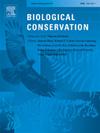Small grants advance global ocean conservation and management equity
IF 4.9
1区 环境科学与生态学
Q1 BIODIVERSITY CONSERVATION
引用次数: 0
Abstract
Threats to ocean health are not distributed equally among nations: low- and middle-income countries (LMICs) are disproportionately impacted by conservation threats, which are frequently driven by high-income countries (HICs). These inequities and resultant challenges have been driven by a long history of colonialism and resource exploitation by HICs. There has been a growing recognition that these colonial practices and inequities have been perpetuated in the ocean science and conservation fields. This recognition has led to increased discourse about the need for social equity in ocean science and conservation. We explore the potential of small grants programs to address conservation challenges in a manner that promotes management equity (one component of social equity) by reviewing the characteristics and outcomes of projects funded in the first 21 years (1999–2020) of the Marine Conservation Action Fund (MCAF), a small grants program focused on global ocean conservation. Our review of MCAF provides evidence that small grants advance global ocean conservation and management equity. We highlight characteristics of grants programs that enable lasting conservation impacts: openness to risk and responsiveness to emerging conservation needs. To promote management equity in conservation science and practice, we recommend ensuring funding is accessible to project leaders and local organizations in LMICs, providing flexibility in proposal and reporting structures, supporting the design and implementation of projects that are driven by local priorities, providing support to projects that engage stakeholders in developing solutions, and seeking input from the leaders the program serves.
小额赠款促进全球海洋保护和管理平等
海洋健康所面临的威胁在各国之间的分布并不均等:中低收入国家(LMICs)受保护威胁的影响尤为严重,而这些威胁往往是由高收入国家(HICs)造成的。长期的殖民主义和高收入国家对资源的掠夺导致了这些不平等现象和由此带来的挑战。越来越多的人认识到,这些殖民主义做法和不公平现象在海洋科学和保护领域长期存在。这种认识促使人们越来越多地讨论海洋科学和保护领域社会公平的必要性。海洋保护行动基金(MCAF)是一个专注于全球海洋保护的小额赠款项目,我们通过回顾该基金前 21 年(1999-2020 年)资助项目的特点和成果,探讨了小额赠款项目以促进管理公平(社会公平的一个组成部分)的方式应对保护挑战的潜力。我们对 MCAF 的审查提供了小额赠款促进全球海洋保护和管理公平的证据。我们强调了能够产生持久保护影响的赠款计划的特点:对风险的开放性和对新出现的保护需求的响应性。为了促进保护科学和实践中的管理公平,我们建议确保低收入和中等收入国家的项目领导者和当地组织能够获得资金,在提案和报告结构方面提供灵活性,支持由当地优先事项驱动的项目设计和实施,为让利益相关者参与制定解决方案的项目提供支持,并寻求项目所服务的领导者的意见。
本文章由计算机程序翻译,如有差异,请以英文原文为准。
求助全文
约1分钟内获得全文
求助全文
来源期刊

Biological Conservation
环境科学-环境科学
CiteScore
10.20
自引率
3.40%
发文量
295
审稿时长
61 days
期刊介绍:
Biological Conservation is an international leading journal in the discipline of conservation biology. The journal publishes articles spanning a diverse range of fields that contribute to the biological, sociological, and economic dimensions of conservation and natural resource management. The primary aim of Biological Conservation is the publication of high-quality papers that advance the science and practice of conservation, or which demonstrate the application of conservation principles for natural resource management and policy. Therefore it will be of interest to a broad international readership.
 求助内容:
求助内容: 应助结果提醒方式:
应助结果提醒方式:


